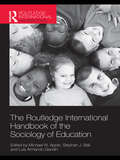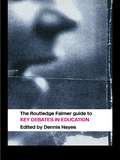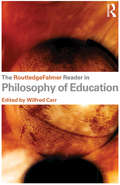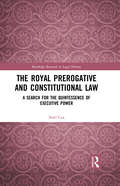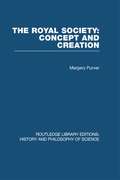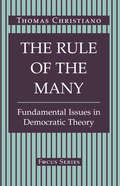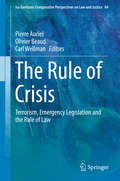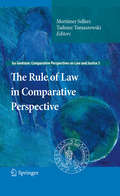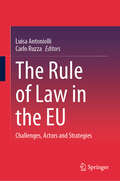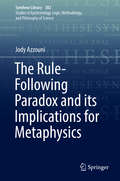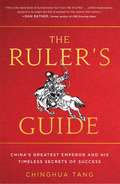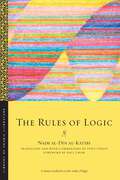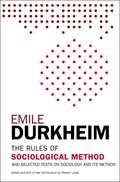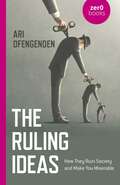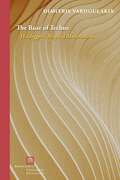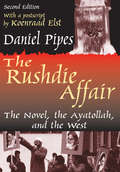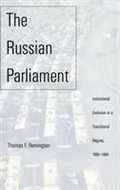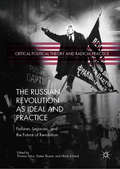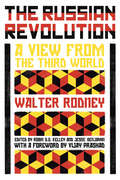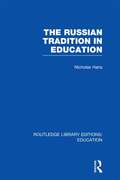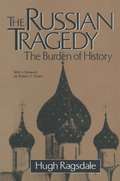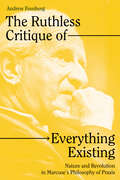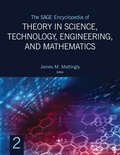- Table View
- List View
The Routledge International Handbook of the Sociology of Education (Routledge International Handbooks of Education)
by Stephen J. Ball Michael W. Apple Luís Armando GandinThis collection brings together many of the world’s leading sociologists of education to explore and address key issues and concerns within the discipline. The thirty-seven newly commissioned chapters draw upon theory and research to provide new accounts of contemporary educational processes, global trends, and changing and enduring forms of social conflict and social inequality. The research, conducted by leading international scholars in the field, indicates that two complexly interrelated agendas are discernible in the heat and noise of educational change over the past twenty-five years. The first rests on a clear articulation by the state of its requirements of education. The second promotes at least the appearance of greater autonomy on the part of educational institutions in the delivery of those requirements. The Routledge International Handbook of the Sociology of Education examines the ways in which the sociology of education has responded to these two political agendas, addressing a range of issues which cover three key areas: perspectives and theories social processes and practices inequalities and resistances. The book strongly communicates the vibrancy and diversity of the sociology of education and the nature of ‘sociological work’ in this field. It will be a primary resource for teachers, as well as a title of major interest to practising sociologists of education.
The RoutledgeFalmer Guide to Key Debates in Education
by Dennis HayesDebating is out of fashion. No one raises the question of what has gone wrong when the entire political project of a society is seemingly reduced to 'education, education, education'.The aim of this lively and challenging book is to provide the stimulus for further thinking about key educational issues by exposing and explaining the assumptions behind this obsession. Over forty contributors, all experts in their fields, have written short, accessible, informed and lively articles for students, teachers and others involved in education. They address broad questions that are central to any understanding of what is really going on in the education system.Topics covered include: the new relationship of the state to education; the changed nature of schools; whether teachers are afraid to teach; the problems with circle time, anti-bullying strategies, citizenship education, and multiple intelligences; the retreat from truth and the demise of theory in teacher training, and much more. Everyone learning to teach in primary and secondary schools and further education colleges will find this book relevant to their programmes. In particular the book would be useful for students on Education Studies courses.
The RoutledgeFalmer Reader in the Philosophy of Education (Routledgefalmer Readers In Education Ser.)
by Wilfred CarrThis Reader brings together a wide range of material to present an international perspective on topical issues in philosophy of education today. Focusing on the enduring trends in this field, this lively and informative Reader provides broad coverage of the field and includes crucial topics.With an emphasis on contemporary pieces that deal with issues relevant to the immediate real world, this book represents the research and views of some of the most respected authors in the field today. Wilfred Carr also provides a specially written introduction which provides a much-needed context to the role of philosophy in the current educational climate.Students of philosophy and philosophy of education will find this Reader an important route map to further reading and understanding.
The Royal Prerogative and Constitutional Law: A Search for the Quintessence of Executive Power (Routledge Research in Legal History)
by Noel CoxThis book examines the royal prerogative in terms of its theory, history and application today. The work explores the development of the royal prerogative through the evolution of imperial government, and more recent structural changes in the United Kingdom and elsewhere in the Commonwealth. While examining specific prerogative powers, the development of justiciability of the prerogative, and the exercise of the prerogative, it lays bare the heart of constitutionality in the Westminster system of government. There is said to be a black hole of unaccountable authority at the heart of the constitution and it is this which this book examines. The focus is upon the constitutional development of the United Kingdom and the old dominions of Canada, Australia and New Zealand. This approach is comparative and historical, using specific case studies of such events as the dissolution of Parliament and the appointment and dismissal of Prime Ministers. The book will be of interest to academics and researchers working in the areas of Constitutional Law and Politics.
The Royal Society: Concept and Creation (Routledge Library Editions: History & Philosophy of Science)
by Margery PurverOriginally published in 1967. The origin of the Royal Society has long been obscured by baffling discrepancies in the evidence. This volume investigates its underlying purpose and creation, at the same time uncovering the real nature of its debt to Francis Bacon and its role in the scientific revolution of the seventeenth century.
The Rule Of The Many: Fundamental Issues In Democratic Theory (Focus Ser.)
by Thomas ChristianoThere is no problem more crucial to contemporary political thought than the status of democracy, its role, and its problems in the contemporary world. In this survey of democratic theory, Thomas Christiano introduces the reader to the principles underlying democracy and to the problems involved in applying these principles to real life situations.Begining with the simple, democratically inspired presumption that the interests of all citizens are to be treated equally, Christiano argues that the implications of such a minimal commitment clarify the nature of democracy and what must be demanded of democratic institutions. He argues that it is the collision of this demand for equality with the fact of pluralism of interests that determines how democratic institutions ought to be designed. This strong sense of reality will be welcomed by those interested in practical questions of transition in newly democratizing states.Christiano combines a broad coverage of important positions taken by others with the exposition of his own ideas, allowing his text to appeal to a wide range of readers, from introductory students to experienced scholars. Clear, accessible, and often elegant, The Rule of the Many is a splendid introduction to democratic theory, one that will take its place as both an important scholarly contribution and as an effective text.
The Rule of Crisis: Terrorism, Emergency Legislation And The Rule Of Law (Ius Gentium: Comparative Perspectives on Law and Justice #64)
by Carl Wellman Pierre Auriel Olivier BeaudThis book analyzes emergency legislations formed in response to terrorism. In recognition that different countries, with different legal traditions, have different solutions, it adopts a comparative point of view. The countries profiled include America, France, Israel, Poland, Germany and United Kingdom. The goal is not to offer judgment on one response or the other. Rather, the contributors offer a comprehensive and thoughtful examination of the entire concept. In the process, they draw attention to the inadaptability of traditional legal and philosophical categories in a new and changing political world. The contributors first criticize the idea of these legislations. They then go on to develop different models to respond to these crises. They build a general analytical framework by answering such questions as: What is an emergency legislation? What kinds of emergencies justify laws of this nature? Why is contemporary terrorism such a specific emergency justifying new laws? Using legal and philosophical reflections, this study looks at how we are changing society. Coverage also provides historical experiences of emergency legislations to further illustrate this point. In the end, readers will gain insight into the long-term consequences of these legislations and how they modify the very work of the rule of law.
The Rule of Law in Comparative Perspective
by Mortimer Sellers Tadeusz TomaszewskiThis new volume on The Rule of Law in Comparative Perspective compares the different conceptions of the rule of law that have developed in different legal cultures. Lawyers and legal scholars from various legal systems describe the social purposes and practical applications of the rule of law, and how it might be improved in the varied circumstances of their own courts and politics. This book will be of interest to lawyers, judges, public officials, and to all those wishing to improve the fundamental structures of their own legal systems, by bringing equal justice to every person subject to the power of the state.
The Rule of Law in the EU: Challenges, Actors and Strategies
by Carlo Ruzza Luisa AntoniolliThis book reflects on the nature of the rule of law in the European Union and the present and future consequences of the attacks that are undermining it. Presenting various case studies, it analyses violations of the rule of law and their impact on the quality of European democracy and on the workings of civil and political society. Written from an interdisciplinary perspective, the book connects legal aspects related to infringements of the rule of law with their political and sociological consequences at both a general and the EU level.The book is divided into three parts. The first focuses on the rule of law in the European context and the threats to democracy posed by its violations. It examines how populist movements and parties utilize the erosion of the checks and balances in liberal democracies to weaken resisting intermediate bodies, such as dissenting civil society groups. The second part concentrates on the political perspectives, which it approaches both in terms of its general features and through a set of case studies related to violations of the rule of law. The third part provides a legal perspective on these issues and examines the impact of the rule of law and its infringement in several areas, impacting both the internal and external dimensions of the EU.
The Rule-Following Paradox and its Implications for Metaphysics
by Jody AzzouniThis monograph presents Azzouni's new approach to the rule-following paradox. His solution leaves intact an isolated individual's capacity to follow rules, and it simultaneously avoids replacing the truth conditions for meaning-talk with mere assertability conditions for that talk. Kripke's influential version of Wittgenstein's rule-following paradox--and Wittgenstein's views more generally--on the contrary, make rule-following practices and assertions about those practices subject to community norms without which they lose their cogency. Azzouni summarizes and develops Kripke's original version of Wittgenstein's rule-following paradox to make salient the linchpin assumptions of the paradox. By doing so, Azzouni reveals how compelling Kripke's earlier work on the paradox was. Objections raised over the years by Fodor, Forbes Ginsborg, Goldfarb, Tait, Wright, and many others, are all shown to fail. No straight solution (a solution that denies an assumption of the paradox) can be made to work. Azzouni illustrates this in detail by showing that a popular family of straight solutions due to Lewis and refined by Williams, "reference magnetism," fail as well. And yet an overlooked sceptical solution is still available in logical space. Azzouni describes a series of "disposition-meaning" private languages that he shows can be successfully used by a population of speakers to communicate with one another despite their ideolectical character. The same sorts of languages enable solitary "Robinson Crusoes" to survive and flourish in their island habitats. These languages--sufficiently refined--have the same properties normal human languages have; and this is the key to solving the rule-following paradox without sacrificing the individual's authority over her self-imposed rules or her ability to follow those rules. Azzouni concludes this unusual monograph by uncovering a striking resemblance between the rule-following paradox and Hume's problem of induction: he shows the rule-following paradox to be a corollary of Hume's problem that arises when the problem of induction is applied to an individual's own abilities to follow rules.
The Ruler's Guide: China's Greatest Emperor and His Timeless Secrets of Success
by Chinghua TangIn the classic tradition of Sun Tzu’s The Art of War, here for the first time in English is the timeless wisdom of China’s greatest emperor Tang Taizong (598-649 AD), which is still being studied more than 1300 years later as an invaluable guide to leading and managing.Tang Taizong is arguably the greatest Emperor in Chinese history. In Asia, many historians rank him with such rulers as Augustus, Genghis Khan, and Napoleon. When he founded the Tang dynasty, Taizong was only twenty-eight years old, and his chief accomplishments were on the battlefield, where he personally slew 1,000 of the enemy. Ultimately, he would defeat the descendants of Attila the Hun, open up the Silk Road trading route, create a golden age of prosperity and cosmopolitan culture, preside over a society in which women enjoyed higher status, and allow Christianity and Islam into China for the first time as well as introduce Buddhism into Tibet. His dynasty would last 300 years. Here, author Chinghua Tang presents conversations between Taizong and his gifted advisers that reveal core aspects of leadership, among them: how to appraise oneself and assess others, how to enhance organizational effectiveness, how to compete with rivals, how to grow power and influence without losing the respect of others, how to learn from the rise and fall of predecessors, and how to craft one’s legacy. An indispensable guide that is as relevant for a middle-manager, military commander, or athletic coach as for a school principal, political leader, or over-stressed parent, The Ruler’s Guide doesn’t just reveal the insights that have kept Taizong’s legacy alive, it spells out how that wisdom is a match for today’s fast-paced, ever changing world.
The Rules of Logic (Library of Arabic Literature)
by Najm al-Dīn al-KātibīA classic textbook on the study of logicIn the Muslim East, logic was an integral part of the syllabus of schools and found to be especially helpful for legal studies. It was in this milieu that The Rules of Logic was composed by Najm al-Dīn al- Kātibī, a scholar of the Shāfiʿī school of law.The Rules of Logic is the most widely read introduction to logic in the Arabic-speaking world. It has probably enjoyed a longer shelf-life than any other logic textbook ever written, having been in use by madrasah students from the early eighth/fourteenth century up until the present day. Building on the theories of Avicenna, al-Rāzī, and other pioneers of logic, al-Kātibī discusses the many pitfalls of building arguments and setting out unambiguous claims in natural language. The enduring nature of the text is a testament to al-Kātibī and his impact on concepts of formal discourse and argument. Accompanied by an informative commentary on the text by translator Tony Street, The Rules of Logic brings to an English readership an influential text that has shaped the work of scholars of logic for centuries.An English-only edition, including a commentary by translator Tony Street.
The Rules of Sociological Method: And Selected Texts on Sociology and its Method (Contemporary Social Theory Ser.)
by Emile Durkheim Steven LukesConsidered a landmark work when it was first published in 1895, The Rules of Sociological Method represents Emile Durkheim's manifesto for sociology. He argues forcefully for the objective, scientific, and methodological underpinnings of sociology as a discipline and establishes guiding principles for future research. With a substantial new introduction by the leading Durkheim scholar Steven Lukes, the book explains and sets into context Durkheim's argument. The still-controversial debates about The Rules of Sociological Method's six chapters are examined and their relevance to present-day sociology is discussed. The edition also includes Durkheim's subsequent thoughts on method in the form of articles, debates with scholars from other disciplines, and letters. This is an essential resource for students and scholars hoping to deepen their understanding of one of the pioneering voices in modern sociology and twentieth-century social thought. Durkheim's methodology is still relevant today. With substantial notes on context, this revised edition will greatly ease the task of students and scholars studying Durkheim and will engage a new generation of readers with his rich contribution to the field.
The Ruling Ideas: How They Ruin Society and Make You Miserable
by Ari OfengendenIdeas that are employed to legitimize and make us consent to authority and its hierarchies also disempower us, leaving us anxious, depressed, and discontent. They are constantly hammered into us by the media, by our friends and family, and by institutions. They also come to us by way of films, motivational speakers, business gurus, as well as in the actions we take in our everyday lives and in the experiences of who we are. In The Ruling Ideas: How They Ruin Society and Make You Miserable, Ari Ofengenden examines many of these ideas, such as the entrepreneurial-self, the utility-oriented economic man, technological progress, virtues and values, as well as family values, God, nation and race. Ofengenden provides a deft analysis, on the one hand, of the beliefs we hold, the ideas behind them that make us consent to the social order, and how we often fool ourselves into believing these ideas; on the other hand, the author proffers a way to combat these ideas, to live without them and develop alternatives.
The Ruse of Techne: Heidegger’s Magical Materialism (Perspectives in Continental Philosophy)
by Dimitris VardoulakisThe Ruse of Techne offers a reappraisal of Heidegger’s entire work by focusing on the forms of activity he regards as separate from instrumentality. Non-instrumental activities like authenticity, poetry, and thinking—in short, the ineffectual—are critical for Heidegger as they offer the only path to the truth of being throughout his work.By unearthing the source of the conception of non-instrumental action in Heidegger’s reading of Aristotle, Vardoulakis elaborates how it forms part of Heidegger’s response to an old problem, namely, how to account for difference after positing a single and unified being that is not amenable to change. He further demonstrates that an action without ends and effects leads to an ethics and politics rife with difficulties and contradictions that only become starker when compared to other responses to the same problem that we find in the philosophical tradition and which rely on instrumentality.Heidegger’s conception of an action without ends or effect forgets the role of instrumentality in the tradition that posits a single, unified being. And yet, the ineffectual has had a profound influence in how continental philosophy determines the ethical and the political since World War II. The critique of the ineffectual in Heidegger is thus effectively a critique of the conception of praxis in continental philosophy. Vardoulakis proposes that it is urgent to undo the forgetting of instrumentality if we are to conceive of a democratic politics and an ethics fit to respond to the challenges of high capitalism.
The Rushdie Affair: The Novel, the Ayatollah and the West
by Daniel PipesThe publication in 1988 of Salman Rushdie's novel The Satanic Verses triggered a furor that pitted much of the Islamic world against the West over issues of blasphemy and freedom of expression. The controversy soon took on the aspect of a confrontation of civilizations, provoking powerful emotions on a global level. It involved censorship, protests, riots, a break in diplomatic relations, culminating in the notorious Iranian edict calling for the death of the novelist. In The Rushdie Affair, Daniel Pipes explains why the publication of The Satanic Verses became a cataclysmic event with far-reaching political and social consequences.Pipes looks at the Rushdie affair in both its political and cultural aspects and shows in considerable detail what the fundamentalists perceived as so offensive in The Satanic Verses as against what Rushdie's novel actually said. Pipes explains how the book created a new crisis between Iran and the West at the time--disrupting international diplomacy, billions of dollars in trade, and prospects for the release of Western hostages in Lebanon.Pipes maps out the long-term implications of the crisis. If the Ayatollah so easily intimidated the West, can others do the same? Can millions of fundamentalist Muslims now living in the United States and Europe possibly be assimilated into a culture so alien to them? Insightful and brilliantly written, this volume provides a full understanding of one of the most significant events in recent years. Koenraad Elst's postscript reviews the enduring impact of the Rushdie affair.
The Russian Parliament: Institutional Evolution in a Transitional Regime, 1989-1999
by Thomas F. RemingtonPolitical representation and parliamentary power -- Gorbachev's constitutional reforms -- Organizing the new USSR Parliament -- The power game in Russia, 1990-1993 -- Deputies and lawmaking in the RSFSR Supreme Soviet -- Framing a new constitution -- Organizing the Federal Assembly -- Does parliament matter'.
The Russian Revolution as Ideal and Practice: Failures, Legacies, and the Future of Revolution (Critical Political Theory and Radical Practice)
by Dieter Thomä Thomas Telios Ulrich SchmidThis volume aims to commemorate, criticize, scrutinize and assess the undoubted significance of the Russian Revolution both retrospectively and prospectively in three parts. Part I consists of a palimpsest of the different representations that the Russian Revolution underwent through its turbulent history, going back to its actors, agents, theorists and propagandists to consider whether it is at all possible to revisit the Russian Revolution as an event. With this problematic as a backbone, the chapters of this section scrutinize the ambivalences of revolution in four distinctive phenomena (sexual morality, religion, law and forms of life) that pertain to the revolution’s historicity. Part II concentrates on how the revolution was retold in the aftermath of its accomplishment not only by its sympathizers but also its opponents. These chapters not only bring to light the ways in which the revolution triggered critical theorists to pave new paths of radical thinking that were conceived as methods to overcome the revolution’s failures and impasses, but also how the Revolution was subverted in order to inspire reactionary politics and legitimize conservative theoretical undertakings. Even commemorating the Russian Revolution, then, still poses a threat to every well-established political order. In Part III, this volume interprets how the Russian Revolution can spur a rethinking of the idea of revolution. Acknowledging the suffocating burden that the notion of revolution as such entails, the final chapters of this book ultimately address the content and form of future revolution(s). It is therein, in such critical political thought and such radical form of action, where the Russian Revolution’s legacy ought to be sought and can still be found.
The Russian Revolution: A View from the Third World
by Vijay Prashad Robin D.G. Kelley Walter Rodney Jesse BenjaminA never-before-published book by the Pan-Africanist and socialist scholar and revolutionaryIn his short life, the Guyanese intellectual Walter Rodney emerged as one of the leading revolutionary thinkers of the Black Sixties. Earning his PhD in 1966 at the age of 24 and publishing his influential history, How Europe Underdeveloped Africa, at 30, Rodney became a leading force of dissent throughout the Caribbean and a lightning rod of controversy. The 1968 Rodney Riots erupted in Jamaica when he was prevented from returning to his teaching post at the University of the West Indies. In 1980, Rodney was assassinated in Guyana, reportedly at the behest of the government. In the mid-’70s, Rodney taught a course on the Russian Revolution at the Universtiy of Dar es Salaam in Tanzania. A Pan-Africanist and Marxist, Rodney sought to make sense of the reverberations of the October Revolution in a decolonizing world marked by Third World revolutionary movements. He intended to publish a book based on his research and teaching. Now historians Jesse Benjamin, Robin D.G. Kelley, and Vijay Prashad have edited Rodney’s polished chapters and unfinished lecture notes, presenting the book that Rodney had hoped to publish.The Russian Revolution is a signal event in radical publishing, and will inaugurate Verso Books's standard edition of Walter Rodney’s works.
The Russian Tradition in Education (Routledge Library Editions: Education)
by Nicholas HansThis volume describes the Russian tradition in education and in particular the dominant role of Russian nationality. The whole history of Russian education is covered from Peter the Great to Khruschev.
The Russian Tragedy: The Burden of History
by Hugh RagsdaleThis work provides an interpretive history of Russia from earliest times to today, recounting the story of Russia's past. It discusses Russia's strengths and weaknesses as a civilization, and the challenges posed by the contemporary effort to remake Russia.
The Ruthless Critique of Everything Existing: Nature and Revolution in Marcuse’s Philosophy of Praxis
by Andrew FeenbergHow Marcuse helps us understand the ecological crisis of the 21st centuryFor several years after 1968, Herbert Marcuse was one of the most famous philosophers in the world. He became the face of Frankfurt School Critical Theory for a generation in turmoil. His fame rested on two remarkable books, Eros and Civilization and One-Dimensional Man. These two books represent the utopian hopes and dystopian fears of the time.In the 1960s and 70s, young people seeking a theoretical basis for their revolution found it in his work. Marcuse not only supported their struggles against imperialism and race and gender discrimination, he foresaw the far-reaching implications of the destruction of the natural environment. Marcuse&’s Marxism was influenced by Husserl and Heidegger, Hegel and Freud.These eclectic sources grounded an original critique of advanced capitalism focused on the social construction of subjectivity and technology. Marcuse contrasted the &“one-dimensionality&” of conformist experience with the &“new sensibility&” of the New Left. The movement challenged a society that &“delivered the goods&” but devastated the planet with its destructive science and technology.A socialist revolution would fail if it did not transform these instruments into means of liberation, both of nature and human beings. This aspiration is alive today in the radical struggle over climate change. Marcuse offers theoretical resources for understanding that struggle.
The SAGE Encyclopedia of Theory in Science, Technology, Engineering, and Mathematics
by James M. MattinglyProject Description: Theories are part and parcel of every human activity that involves knowing about the world and our place in it. In all areas of inquiry from the most commonplace to the most scholarly and esoteric, theorizing plays a fundamental role. The SAGE Encyclopedia of Theory in Science, Technology, Engineering, and Mathematics focuses on the ways that various STEM disciplines theorize about their subject matter. How is thinking about the subject organized? What methods are used in moving a novice in given field into the position of a competent student of that subject? Within the pages of this landmark work, readers will learn about the complex decisions that are made when framing a theory, what goes into constructing a powerful theory, why some theories change or fail, how STEM theories reflect socio-historical moments in time and how – at their best – they form the foundations for exploring and unlocking the mysteries of the world around us. Featuring more than 200 authoritative articles written by experts in their respective fields, the encyclopedia includes a Reader’s Guide that organizes entries by broad themes; lists of Further Readings and cross-references that conclude each article; and a Resource Guide listing classic books in the field, leading journals, associations, and key websites.
The SAGE Encyclopedia of Theory in Science, Technology, Engineering, and Mathematics
by James M. MattinglyProject Description: Theories are part and parcel of every human activity that involves knowing about the world and our place in it. In all areas of inquiry from the most commonplace to the most scholarly and esoteric, theorizing plays a fundamental role. The SAGE Encyclopedia of Theory in Science, Technology, Engineering, and Mathematics focuses on the ways that various STEM disciplines theorize about their subject matter. How is thinking about the subject organized? What methods are used in moving a novice in given field into the position of a competent student of that subject? Within the pages of this landmark work, readers will learn about the complex decisions that are made when framing a theory, what goes into constructing a powerful theory, why some theories change or fail, how STEM theories reflect socio-historical moments in time and how – at their best – they form the foundations for exploring and unlocking the mysteries of the world around us. Featuring more than 200 authoritative articles written by experts in their respective fields, the encyclopedia includes a Reader’s Guide that organizes entries by broad themes; lists of Further Readings and cross-references that conclude each article; and a Resource Guide listing classic books in the field, leading journals, associations, and key websites.
